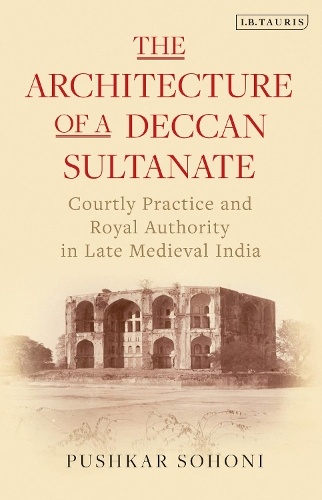
The Architecture of a Deccan Sultanate: Courtly Practice and Royal Authority in Late Medieval India
(Paperback)
Available Formats
Publishing Details
The Architecture of a Deccan Sultanate: Courtly Practice and Royal Authority in Late Medieval India
By (Author) Pushkar Sohoni
Bloomsbury Publishing PLC
I.B. Tauris
20th February 2020
United Kingdom
Classifications
Tertiary Education
Non Fiction
Social groups: religious groups and communities
Social and cultural history
European history
720.954809031
Physical Properties
Paperback
320
Width 138mm, Height 216mm
372g
Description
The Deccan sultans left a grand architectural and artistic legacy. They commissioned palaces, mosques, gardens and tombs as well as decorative paintings and coins. Of these sultanates, the Nizam Shahs (r. 1490-1636) were particularly significant, being one of the first to emerge from the crumbling edifice of the Bahmani Empire (c. 1347-1527). Yet their rich material record remains largely unstudied in the scholarly literature, obscuring their cultural and historical importance. This book provides the first analysis of the architecture of the Nizam Shahs. Pushkar Sohoni examines the critical relationship between architectural production, courtly practice and royal authority in a period when the aspirations and politics of the kingdom were articulated through architectural expression. Based on new primary research from key sites including the urban settlements of Ahmadnagar, Daulatabad, Aurangabad, Junnar and the port city of Chaul, Sohoni sheds light on broader Islamicate ideas of kingship and shows how this was embodied by material artefacts such as buildings and sites, paintings, gardens, guns and coins. As well as offering a vivid depiction of sixteenth-century South Asia, this book revises understanding of the cultural importance of the Nizam Shahs and their place in the Indian Ocean world. It will be a vital primary resource for scholars researching the history of the medieval and early modern Deccan and relevant for those working in Art History, Islamic Studies, South Asian Studies and Archaeology.
Reviews
Any reader, academic or casual, of Sohonis splendid monograph must feel humbled by the enormity of his labour, his scholarly acumen and his gentle humanism. * The Muslim World Book Review *
Author Bio
Pushkar Sohoni is a Lecturer in South Asian Studies at the University of Pennsylvania. He previously taught at the University of British Columbia and has had fellowships at various institutions, including the American Institute of Indian Studies, the Max-Planck Institute and the Philadelphia Museum of Art. He has published in the books The Visual World of Muslim India and Garden and Landscape Practices in Pre-Colonial India and in the Journal of Deccan Studies and South Asian Studies. He received his doctorate in the History of Art from the University of Pennsylvania.
